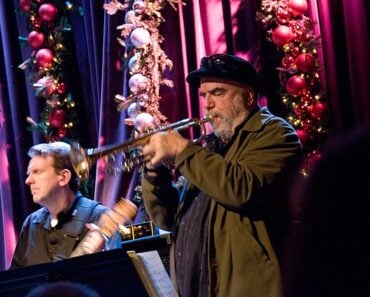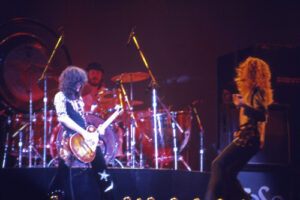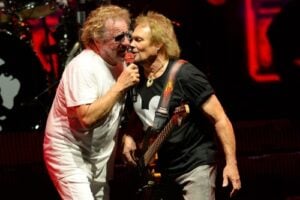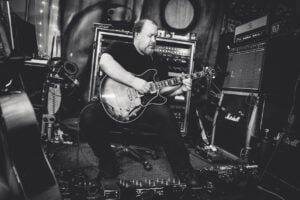
Feature Photo: Paul Keeling / Shutterstock.com
From intimate ballads to grandiose anthems, these songs demonstrate how “heaven” has inspired some of the most evocative and enduring moments in rock history. Bryan Adams captures the bliss of romantic union with “Heaven,” a timeless ballad that resonates with heartfelt simplicity. INXS turns the celestial into the carnal with “Heaven Sent,” a sultry anthem of passion and desire. Heart’s “Rockin’ Heaven Down” celebrates the communal ecstasy of rock and roll, blending raw power with spiritual overtones. Bob Dylan’s “Knockin’ on Heaven’s Door” meditates on mortality with a poignant simplicity that has made it one of his most enduring works. Maria McKee’s “Show Me Heaven” offers a soaring exploration of love and longing, her voice imbuing the song with emotional depth. Frank Zappa’s reimagining of “Stairway to Heaven” transforms Led Zeppelin’s classic into a playful, virtuosic commentary on musical conventions.
# 10 – Heaven – Bryan Adams
Bryan Adams’ “Heaven,” an enduring anthem of love and devotion, was recorded during the sessions for his Reckless album in 1983. The track was initially conceived for the A Night in Heaven film soundtrack before being included on Adams’ breakthrough album, which was released on November 5, 1984. The song was recorded at Power Station Studios in New York City, with Adams and his longtime collaborator, Jim Vallance, sharing songwriting credits. Produced by Adams and Bob Clearmountain, Reckless showcased a polished rock sound that brought Adams international acclaim. “Heaven” epitomized this mix of heartfelt lyricism and stadium-ready balladry. Notably, the ethereal tone of the song is enriched by Tommy Mandel’s delicate keyboard work, but the recording does not feature a trumpet solo, distinguishing it from other tracks where instrumental solos heighten the emotional resonance.
Read More: Top 10 Bryan Adams Songs
# 9 – Heaven Must Be Missing An Angel – Tavares
Tavares’ “Heaven Must Be Missing an Angel” exemplifies the radiant blend of soul, funk, and disco that defined the late 1970s. Released in 1976 as a two-part single and featured on their album Sky High!, the song was recorded at Capitol Studios in Hollywood, California. Produced by the renowned Dennis Lambert and Brian Potter, the track reflects the duo’s knack for crafting danceable hits with infectious melodies. While the song does not include a trumpet solo, its dynamic arrangement owes much to a lush horn section, layered strings, and the rhythmic precision of session musicians. The Tavares brothers—Ralph, Pooch, Chubby, Butch, and Tiny—lend their signature harmonies, with lead vocals by Chubby Tavares infusing the track with soulful intensity. Critically and commercially, the song was a triumph. It reached number fifteen on the Billboard Hot 100.
Read More: Top 10 Tavares Songs
# 8 – Heaven Sent – INXS
With “Heaven Sent,” INXS unleashed a fiery burst of energy that showcased their evolving artistry during the early 1990s. Featured on their eighth studio album, Welcome to Wherever You Are, released on August 3, 1992, the song stands out as a powerful statement of reinvention. Recorded at Rhinoceros Studios in Sydney, Australia, in 1991, the track was produced by longtime collaborator Mark Opitz. The Farriss brothers—Andrew, Tim, and Jon—alongside Kirk Pengilly, Garry Gary Beers, and the magnetic Michael Hutchence, brought their signature chemistry to this dynamic piece. While the song doesn’t feature a trumpet solo, Pengilly’s intricate saxophone work and the relentless guitar riffs add a bold edge to the track’s high-octane sound. Charting at number 13 on the Australian ARIA Singles Chart and breaking into the UK Top 40, “Heaven Sent” demonstrated the band’s enduring global appeal.
Read More: Top 10 INXS Songs
# 7 – Heaven’s On Fire – Kiss
Kiss brought their signature fiery energy to “Heaven’s On Fire,” the lead single from their 1984 album, Animalize. Recorded at Right Track Studios in New York City, the song marked a transitional period for the band as they embraced a glam-metal sound under the production of Paul Stanley and Michael James Jackson. “Heaven’s On Fire” was co-written by Stanley and songwriter Desmond Child, whose knack for crafting radio-friendly rock anthems is evident throughout the track. Kiss members during this era included Stanley (vocals and rhythm guitar), Gene Simmons (bass and vocals), Eric Carr (drums), and Mark St. John (lead guitar), whose blistering riffs punctuate the song’s vibrant production. While the track does not feature a trumpet solo, its fiery instrumentation and searing guitar work create an explosive soundscape.
Read More: Tommy Thayer of Kiss: The ClassicRockHistory.com Interview
Read More: Ace Frehley: The ClassicRockHistory.com Interview
# 6 – Jackie Wilson Said (I’m in Heaven When You Smile) – Van Morrison
Van Morrison’s “Jackie Wilson Said (I’m in Heaven When You Smile)” radiates joy and energy, a testament to the artist’s admiration for the music of Jackie Wilson and the emotional transcendence of love. Recorded in spring 1972 at Wally Heider Studios in San Francisco, the track is part of Morrison’s Saint Dominic’s Preview album, released on July 21, 1972. Produced by Morrison, the song features his signature blend of soul, jazz, and R&B, with a lively arrangement that underscores the upbeat, celebratory tone of the lyrics. Key contributors to the track include Jules Broussard on saxophone, John McFee on guitar, and Morrison himself on vocals and rhythm guitar. While the song does not feature a trumpet solo, the brass elements, including Broussard’s saxophone, play a vital role in creating its buoyant sound.
Read More: Our 10 Favorite Van Morrison Songs
# 5 – Heaven Can Wait – Meat Loaf
“Heaven Can Wait,” a hauntingly beautiful ballad from Meat Loaf’s iconic album Bat Out of Hell, stands as a testament to the theatricality and emotional depth that defined the collaboration between Meat Loaf and songwriter Jim Steinman. Released on October 21, 1977, Bat Out of Hell was produced by Todd Rundgren and recorded at Bearsville Studios in Woodstock, New York. The album featured an ensemble of highly skilled musicians, including Roy Bittan on piano and Max Weinberg on drums—both members of Bruce Springsteen’s E Street Band—along with Todd Rundgren on guitar. The soaring orchestral arrangement, including contributions from the New York Philharmonic, elevates the song to celestial heights. Notably, “Heaven Can Wait” does not include a trumpet solo, instead relying on piano, strings, and Meat Loaf’s powerful vocal performance to convey its emotional intensity.
The lyrics of “Heaven Can Wait” weave a poignant narrative of yearning and transcendence, as the protagonist reflects on life, love, and an almost spiritual connection to paradise. The line “I’ve got a taste of paradise, I’m never gonna let it slip away” anchors the song in the theme of this list, emphasizing the pull of heaven while choosing to remain grounded in the beauty of earthly existence. The imagery of angels, gods, and melodies reinforces the celestial motif, creating an ethereal yet deeply personal meditation on mortality and fulfillment. This reflective tone contrasts with the fiery passion of Kiss’s “Heaven’s On Fire,” demonstrating the broad emotional spectrum tied to the concept of heaven in rock music.
Critically, Bat Out of Hell received mixed initial reviews but went on to become one of the best-selling albums of all time, with over 40 million copies sold worldwide. “Heaven Can Wait,” though not released as a single, was praised for its tender and introspective quality, serving as a counterpoint to the album’s more bombastic tracks like “Bat Out of Hell” and “Paradise by the Dashboard Light.” Meat Loaf’s evocative vocal delivery, combined with Steinman’s poetic lyrics and Bittan’s masterful piano accompaniment, has made the song a fan favorite. Its quiet, contemplative nature distinguishes it from the exuberance of Van Morrison’s “Jackie Wilson Said (I’m in Heaven When You Smile),” showing yet another facet of how heaven can be interpreted musically.
“Heaven Can Wait” is a deeply moving composition that captures the longing and grace inherent in the human experience. Its timeless quality and thematic resonance make it an essential addition to this list, offering a poignant reminder of the power of music to explore life’s most profound emotions.
Read More: Top 10 Meat Loaf Songs
# 4 – Rockin’ Heaven Down – Heart
“Rockin’ Heaven Down” channels the raw energy and unbridled emotion that defined Heart’s evolution in the late 1970s and early 1980s. Featured on their Bébé le Strange album, released on February 14, 1980, the track was recorded at Kaye-Smith Studios in Seattle, Washington. Produced by Mike Flicker, the song showcases the power of the band’s lineup at the time, with Ann Wilson’s soaring vocals driving the emotional core and Nancy Wilson’s masterful guitar work providing a robust foundation. Howard Leese on guitar and keyboards, Steve Fossen on bass, and Michael Derosier on drums round out the arrangement, which captures the relentless intensity that Heart brought to their recordings.
The lyrics of “Rockin’ Heaven Down” evoke the euphoria and unity that music can inspire. Lines like “Roll out the soul, you get that feel, and everybody knows” emphasize the collective connection between the performer and the audience, while the refrain “Rockin’ heaven down” conveys an almost spiritual transcendence through sound. The metaphor of “a band of wild angels” further elevates the experience, tying the song’s imagery to the broader theme of heaven as something we create together in moments of pure passion and freedom. Unlike the reflective tone of Meat Loaf’s “Heaven Can Wait,” which focuses on personal introspection, Heart’s contribution to this list celebrates the communal and ecstatic nature of heavenly experiences.
Read More: 10 Most Rocking Heart Songs
# 3 – Show Me Heaven – Maria McKee
Maria McKee’s “Show Me Heaven” is an evocative ballad that melds emotional vulnerability with cinematic grandeur. Released in 1990 as part of the soundtrack for Days of Thunder, the song was produced by Peter Asher and recorded at The Complex in Los Angeles, California. Written by McKee, Eric Rackin, and Jay Rifkin, it showcases McKee’s breathtaking vocal delivery, which balances raw emotion with exquisite control. The lush instrumentation includes strings arranged to heighten the song’s sweeping, almost ethereal quality. While there is no trumpet solo in the track, the orchestral arrangement and McKee’s impassioned performance ensure its emotional resonance is undeniable.
Read More: 10 Maria McKee Songs That Will Leave You Mesmerized
# 2 – Knocking On Heaven’s Door – Bob Dylan
Bob Dylan’s “Knockin’ on Heaven’s Door” stands as one of the most poignant and enduring songs of his career. Written and recorded for the 1973 film Pat Garrett & Billy the Kid, the song was produced by Gordon Carroll and recorded at Burbank Studios in California. The minimalist arrangement features Dylan on vocals, guitar, and harmonica, with Booker T. Jones on bass, Roger McGuinn on guitar, and Jim Keltner on drums. The recording captures an intimate and somber atmosphere, perfectly complementing the song’s themes of mortality and resignation. While the track does not feature a trumpet solo, the simplicity of the instrumentation allows Dylan’s voice and lyrics to remain the focus.
The song achieved critical and commercial success, peaking at number 12 on the Billboard Hot 100. Its universal themes and timeless melody have inspired countless covers, with interpretations spanning genres from rock to reggae. Dylan’s original version, however, remains unmatched in its emotional depth and simplicity. Unlike Maria McKee’s “Show Me Heaven,” which explores the longing for love and connection, Dylan’s “Knockin’ on Heaven’s Door” is an acceptance of life’s impermanence, a stark yet beautiful meditation on what lies beyond.
Read More: Best Bob Dylan Songs Of The 1970s
# 1 – Stairway To Heaven – Frank Zappa Version
Frank Zappa’s reinterpretation of “Stairway to Heaven,” featured on his 1991 live album The Best Band You Never Heard in Your Life, transforms Led Zeppelin’s iconic song into a showcase of Zappa’s unparalleled creativity and wit. Recorded during Zappa’s 1988 world tour, the track retains the structural integrity of the original while injecting his unique blend of satire and technical innovation. This live rendition features Zappa’s expert band, including Mike Keneally on guitar, Ike Willis on vocals, and Ed Mann on percussion, creating a vibrant reinterpretation that pushes the boundaries of the original. The performance’s theatricality, complete with a brass arrangement replicating the famous guitar solo, exemplifies Zappa’s penchant for turning rock classics into something wholly new and provocative.
Lyrically, “Stairway to Heaven” is steeped in spiritual imagery, exploring themes of longing, self-discovery, and the pursuit of transcendence. Robert Plant’s original verses remain intact, but Zappa’s performance adds layers of irony and playfulness, challenging the song’s almost sacred reputation. The dramatic shifts in instrumentation and tone, including brass flourishes and unexpected comedic elements, reframe the song’s celestial quest, offering a tongue-in-cheek interpretation of the idea of heaven. In contrast to Bob Dylan’s “Knockin’ on Heaven’s Door,” which reflects quiet introspection on mortality, Zappa’s “Stairway to Heaven” emphasizes irreverence and the boundless possibilities of musical reinvention.
Critically, Zappa’s rendition has been praised for its audacity and technical brilliance. The Best Band You Never Heard in Your Life captures the spirit of Zappa’s live performances, where even the most revered rock songs were subject to his deconstruction and satire. This reimagining of “Stairway to Heaven” stands out for its orchestral complexity and the band’s ability to recreate and parody Led Zeppelin’s epic with precision and humor. Where Maria McKee’s “Show Me Heaven” offers a deeply emotional exploration of love and connection, Zappa’s version of “Stairway to Heaven” celebrates the joy of breaking conventions and embracing the unexpected.
Frank Zappa’s “Stairway to Heaven” is a bold and ingenious reinterpretation that pays homage to the original while challenging its mystique. Its inclusion in this list highlights how heaven, as a concept, can inspire music that is reverent, irreverent, or somewhere in between, offering an expansive and dynamic perspective on one of rock’s most enduring themes.
Read More: 25 Classic Led Zeppelin Songs Everyone Should Know
Read More: A Method in Exploring the Frank Zappa Album’s Catalog




































One of the best slick and polished pop-rock songs of the late 80s, I would have to put in a vote for Belinda Carlisle’s 1987 hit “Heaven Is A Place On Earth” from her similarly titled LP ,”Heaven On Earth”.
Entire LP was overall strong as well.
Also, if you have your platform shoes in the attic, it is hard to beat Donna Summer’s 1978 hit “Heaven Knows” from 1978’s “Live and More” L.P., with it’s Barry White influenced inflections, and driving beat, along with Ms. Summer’s distinctive vocal ability.